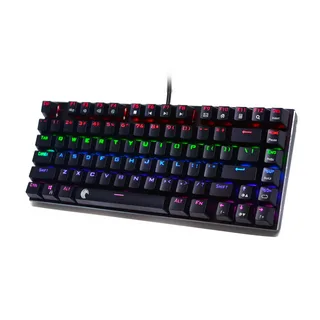As mechanical keyboards grow in popularity, many users are turning to smaller layouts for both style and function. From the ultra-compact 40% keyboards to the more common 60% and 75% layouts, small mechanical keyboards are making waves among gamers, writers, programmers, and minimalists alike. But what exactly do you lose—and gain—when you make the switch to a smaller board?
Benefits of a Small Mechanical Keyboard
1. Space-Saving Design
One of the most immediate benefits is the reduced desk footprint. A small mechanical keyboard allows for a cleaner, more organized workspace. This is ideal for those with limited desk space or who prefer a minimalist setup. With fewer keys, you also get more room for mouse movement—especially helpful for gamers and designers.
2. Portability
Another major win is portability. A small keyboard is much easier to carry in a backpack or laptop bag. This is great for people who frequently work remotely or move between different workstations. Whether you’re commuting to work or heading to a café, a compact mechanical keyboard makes travel easier.
3. Ergonomics and Comfort
By reducing the distance your hands have to travel, small keyboards can actually improve ergonomics. With your mouse closer to your typing hand, there’s less strain on your shoulders and wrists, which can reduce fatigue during long hours of use.
Downsides of Going Compact
1. Missing Keys
When considering what you lose and gain with a small mechanical keyboard, the most obvious downside is the absence of dedicated keys. Many compact layouts omit the function row, arrow keys, and even the number pad. This can slow down productivity for those who rely heavily on these features.
2. Learning Curve
Adjusting to a new layout can be challenging. You’ll likely need to memorize key combinations for functions you once had dedicated keys for. This learning curve can be frustrating, especially for those who type fast or use shortcuts often.
3. Limited Customization for Some Users
While many small mechanical keyboards are highly customizable, not all models support hot-swapping or firmware reprogramming. This means that unless you invest in a premium board, you might be stuck with a fixed layout or limited macro options.
Who Should Use a Small Mechanical Keyboard?
If you’re a minimalist, a frequent traveler, or someone who values a clean desk setup, a small mechanical keyboard may be the perfect choice. Gamers also appreciate the improved mouse space and faster reaction time that can come from tighter setups. However, if you’re a number cruncher, programmer, or someone who uses a wide range of shortcuts, the losses may outweigh the gains—unless you’re ready to adapt.
Final Thoughts
Understanding what you lose and gain with a small mechanical keyboard is key before making the switch. While you gain portability, desk space, and sometimes even comfort, you do lose certain conveniences that traditional full-sized keyboards offer. Weighing your specific needs and workflow habits will help determine if a compact layout is right for you.


